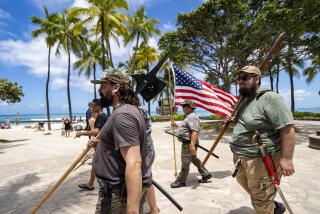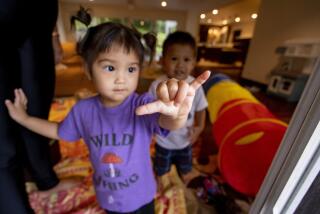The Plucky Ukulele Enjoys a New Surge in Popularity
- Share via
HONOLULU — The ukulele, an island icon for more than a century, is picking up in popularity, especially among young islanders. It’s also hot in Japan and is catching on with West Coast kids.
“Every ukulele that is made is out the door,” says Fred Kamaka Jr.
Kamaka Hawaii hasn’t had inventory since 1982, he says, and there’s a two-year backlog in orders. The Kamaka family has made the instruments since 1916 to wholesale to music stores, mostly in Hawaii.
Now, other manufacturers have gone into business to help meet the demand.
Mainlanders recall the ukulele from the ditties played decades ago by Arthur Godfrey, Elvis Presley and Tiny Tim. But in Hawaii it’s a symbol that rivals hula girls in ti-leaf skirts and swaying palm trees silhouetted by the moonlight.
“The ukulele is so symbolic of the islands,” Sam Kamaka Jr. says, and the sound so “majestic and magnifying.”
Kamaka Hawaii sells about 2,500 ukuleles a year, starting at about $300. The Hawaiian word “ukulele” actually means “jumping flea,” derived from the way players’ fingers quickly move from string to string.
“There definitely is a revival now,” Fred Kamaka Jr., says. “A lot more young kids are playing.”
It’s now common to find someone strumming while sitting in a beach park, standing in a line or waiting at a bus stop.
“In high school, it just became something popular,” says Ryan Carvalho, a mid-20s aficionado. He has been playing the ukulele for eight years and hopes to make a recording. “A lot of young guys are coming out, making CDs, making money. I like to see that.”
Ukulele classes are packed with youngsters eager to imitate the success of their idols, including Jake Shimabukuro of Pure Heart, the award-winning Hawaiian music group.
“The ukulele now is as popular as I’ve ever seen it,” says Roy Sakuma, an instructor for 34 years. “We are finding people can play just about any kind of music with a ukulele.”
In Japan, kids are buying ukuleles to play everything from rock ‘n’ roll to traditional Japanese songs. There also are increasing numbers of ukulele clubs on the U.S. mainland, especially the West Coast.
“It’s the ‘in’ thing to play,” says Sakuma, who also produces CDs of his own music and that of others.
The ukulele also was the “in” thing shortly after its arrival in Hawaii.
When the ship Ravenscrag arrived in Honolulu Harbor in 1879 from the Portuguese island of Madeira, a passenger started playing a small four-stringed instrument similar to the braguinha, which is still popular on Madeira. Early on, it was called “pila li’ili’i,” or “little fiddle.”
Five years later, ukuleles were being made on the islands and eventually became the favored instrument of King David Kalakaua, the “Merrie Monarch.”
After it was showcased at the 1915 Panama-Pacific International Exposition in San Francisco, the ukulele took off in the United States. The Henry Kalimai song “On the Beach at Waikiki” was an early hit. But the fad soon faded in favor of swing music.
The ukulele remained popular in Hawaii, thanks to players like Ernest Kaai and Jesse Kalima. And in the late 1940s and early 1950s, when Godfrey started playing one, the ukulele craze took hold on the mainland again.
Godfrey’s show exposed millions of Americans to the instrument, and many bought plastic “T.V. Pal Uke” models that sounded surprisingly good.
Presley played a ukulele in the 1961 movie “Blue Hawaii.” And Tiny Tim, a regular guest on “The Tonight Show,” became synonymous with “Tip Toe Through the Tulips With Me,” a song he played and sang.
“But that exposure still didn’t recognize it as a first-rate instrument,” Sakuma says. “Today, more and more people are aware.”
The current revival began in 1991, with players who made the ukulele the focus of their music: Troy Fernandez of the now-disbanded Ka’au Crater Boys, the Ho’opi’i Brothers and the late Israel Kamakawiwo’ole, whose massive body dwarfed the tiny ukulele he cradled in his chest and played with grace and gentleness.
One person who takes the revival in stride is “Auntie” Genoa Keawe, the famed island falsetto singer who has been playing for about 70 years.
“It makes everybody happy when they hear you play,” Keawe says.
More to Read
Sign up for The Wild
We’ll help you find the best places to hike, bike and run, as well as the perfect silent spots for meditation and yoga.
You may occasionally receive promotional content from the Los Angeles Times.






